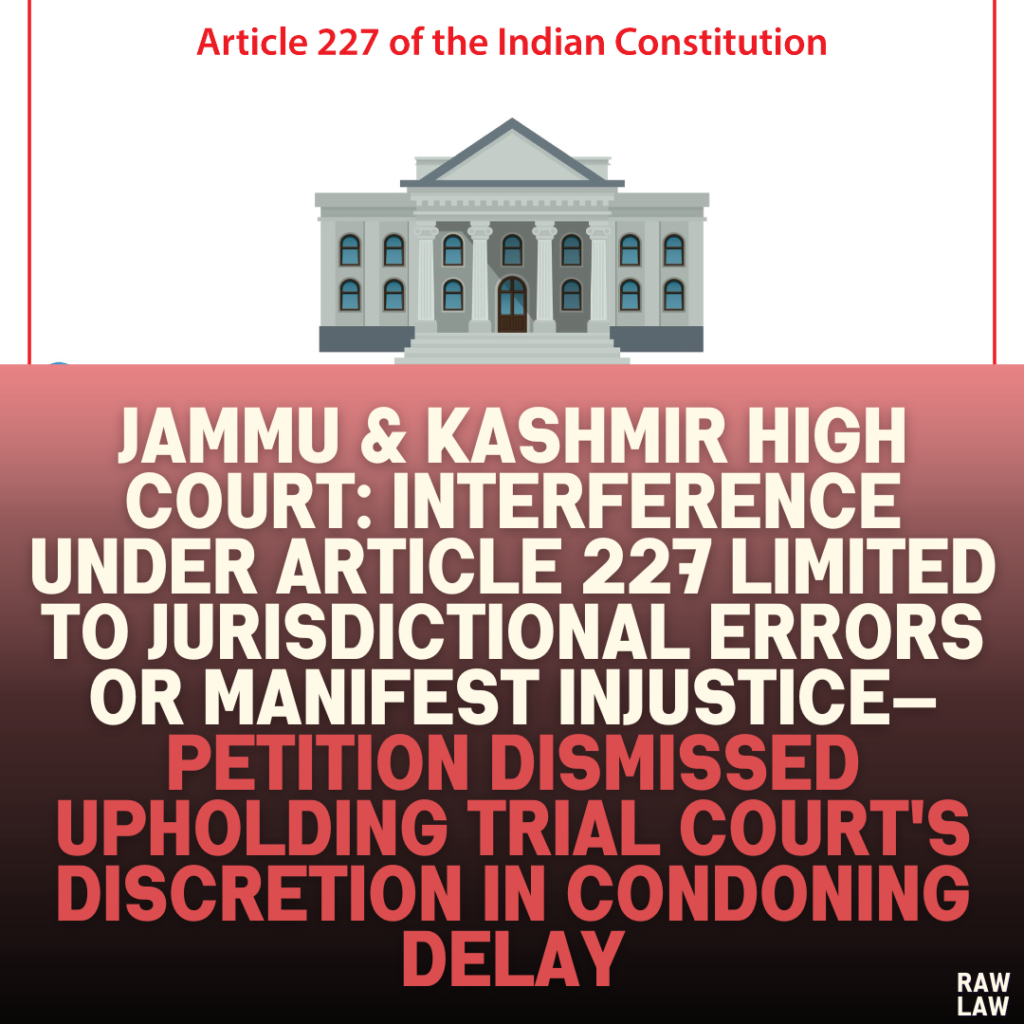Court’s Decision
The High Court of Jammu & Kashmir and Ladakh dismissed a petition challenging a trial court order that condoned the delay in filing an application to set aside an ex parte decree. The court emphasized that the trial court acted within its jurisdiction and based its decision on settled legal principles. It observed:
“This Court does not find any jurisdictional error on the part of the learned trial court. Once the trial court has exercised its discretion on the basis of settled proposition of law, this Court does not find any reason to show indulgence.”
The petition was deemed “misconceived” and summarily dismissed.
Facts
- An ex parte decree was passed on 23.08.2014 in favor of the petitioner. The respondents were set ex parte on 05.09.2012 due to their non-appearance in court.
- The respondents argued that they relied on their counsel’s advice that their presence in court was unnecessary. Acting in good faith, they did not attend hearings. However, their counsel failed to appear, leading to the ex parte decree.
- The respondents claimed they became aware of the ex parte decree only on 12.08.2015 during execution proceedings.
- They applied for a certified copy of the judgment on 30.09.2015, received it on 15.10.2015, and filed an application for condonation of delay on 15.12.2015.
- The trial court condoned the delay, citing sufficient cause demonstrated by the respondents.
- The petitioner challenged this order under Article 227 of the Constitution, arguing that the trial court erred in granting relief.
Issues
- Was the trial court justified in condoning the delay in filing the application to set aside the ex parte decree?
- Does the High Court have the authority under Article 227 to interfere with the trial court’s discretionary order?
Petitioner’s Arguments
The petitioner raised the following points:
- The trial court’s decision to condone the delay was mechanical and lacked proper consideration of the respondents’ conduct.
- The respondents exhibited negligence by failing to participate in proceedings from 2012 to 2015, a delay of nearly three years.
- The delay from 12.08.2015 (when the respondents gained knowledge of the decree) to 15.12.2015 (when the application was filed) was not justified.
- The trial court’s reliance on the counsel’s fault as a sufficient cause for condonation ignored the respondents’ inaction and lack of due diligence.
Respondent’s Arguments
The respondents presented the following justifications:
- They relied on their counsel’s advice, which led them to believe that their personal appearance was unnecessary.
- Upon learning of the ex parte decree during execution proceedings, they promptly sought a certified copy of the judgment and engaged a new counsel.
- The delay was due to circumstances beyond their control and was not driven by malafide intentions or gross negligence.
- Sufficient cause existed to warrant condonation of delay, consistent with judicial precedents advocating a liberal approach to procedural delays.
Analysis of the Law
- Legal Principles for Condonation of Delay
- The trial court emphasized that procedural delays caused by counsel’s actions or advice should not unduly prejudice litigants.
- Judicial precedents advocate a liberal and pragmatic approach to condonation, especially where litigants demonstrate good faith and absence of malafide intent.
- Trial Court’s Reasoning
- The trial court considered the respondents’ explanation reasonable, citing reliance on their counsel’s advice as sufficient cause.
- It also highlighted that adopting a “pedantic and hyper-technical view” in such cases would defeat the ends of justice.
- High Court’s View
- The High Court noted that the trial court’s discretion was exercised within jurisdiction and aligned with established legal principles.
- Article 227 limits the High Court’s interference to cases involving jurisdictional errors or manifest injustice, neither of which was evident here.
Precedent Analysis
The trial court relied on Supreme Court pronouncements affirming that:
- Procedural delays caused by reliance on legal counsel can constitute sufficient cause for condonation.
- A strict and technical interpretation of procedural rules should not impede the substantive rights of litigants.
The High Court concurred, finding the trial court’s decision consistent with these principles.
Court’s Reasoning
The High Court provided a detailed rationale:
- Jurisdictional Validity
The trial court’s order was well within its jurisdiction, based on facts and settled legal principles. - Discretionary Nature of Condonation
The decision to condone delay is a discretionary exercise. Courts are advised to adopt a balanced approach, considering both procedural rules and substantive justice. - Limits of Article 227
The High Court reiterated that interference under Article 227 is warranted only when jurisdictional errors or manifest injustice are apparent. The petitioner failed to demonstrate either.
Conclusion
The petition was dismissed, with the High Court affirming the trial court’s decision to condone the delay. The High Court emphasized the importance of judicial discretion in procedural matters and the need for a liberal approach in condoning delays to facilitate justice.
Implications
- Judicial Discretion
The judgment reinforces that trial courts have the discretion to condone delays when litigants demonstrate sufficient cause, and higher courts should not interfere lightly. - Reliance on Counsel
Litigants’ reliance on counsel’s advice continues to be a significant factor in evaluating procedural delays, ensuring that procedural lapses do not undermine substantive rights. - Article 227 Jurisprudence
The case limits the scope of High Court interference under Article 227, safeguarding the autonomy of lower courts in discretionary matters.
